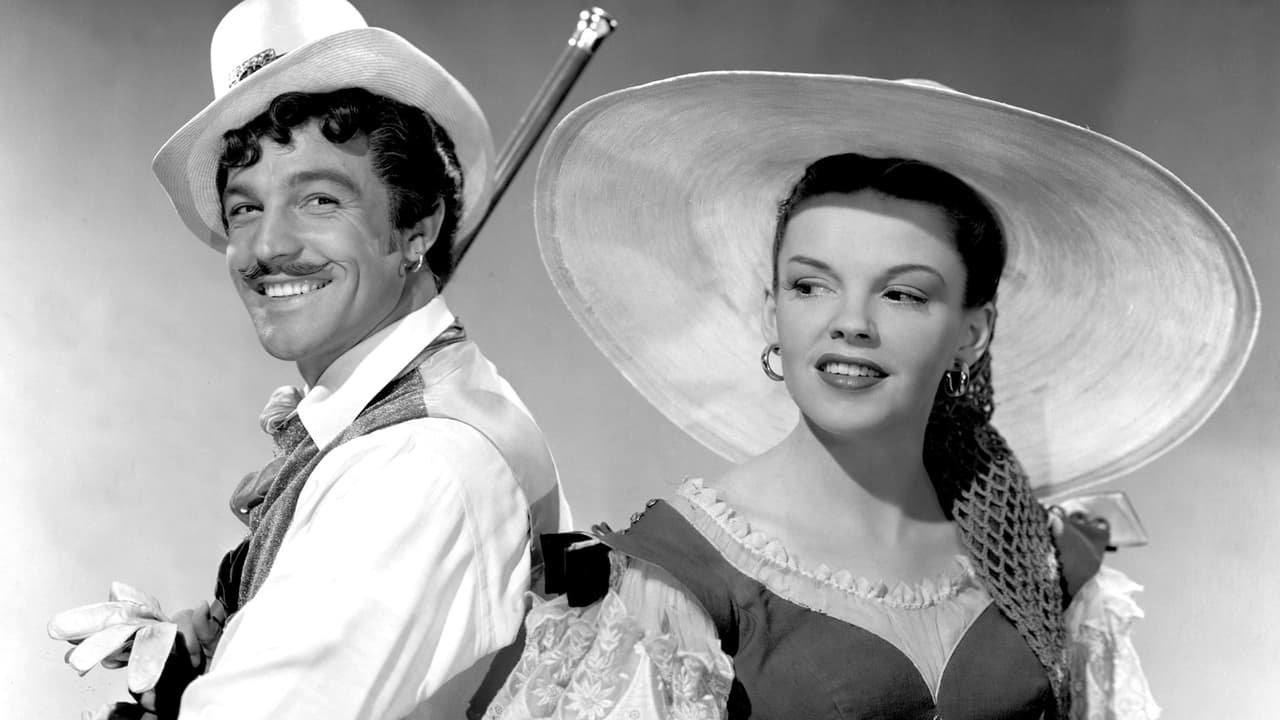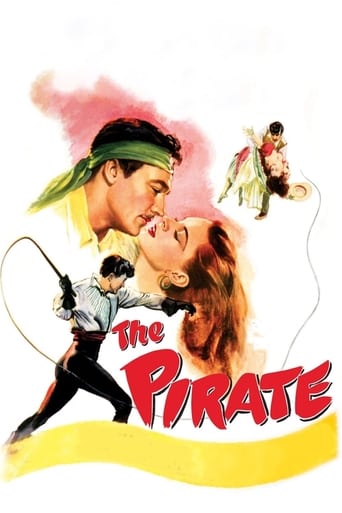

I didn't really like The Pirate, but I totally understand why other people think it's a classic. Gene Kelly and Judy Garland team up in an odd, stylized period piece; she's dreading an arranged marriage to Walter Slezak, and he's part of a travelling circus troupe that comes to town. The love story is not hard to predict. The songs-with exception to "Be a Clown," which sounds almost identical to "Make 'Em Laugh"-aren't very memorable or toe-tapping. The dance numbers are a little tiresome, as is the acting.However, if you enjoy Judy and Gene's hammy chemistry together, you can rent this one. If you liked Summer Stock, there's a good shot you'll like The Pirate, and vice versa. They're both a little too corny and campy for my taste. When someone acts for the back row of an amphitheater in a closeup, it's not very enjoyable for me. Plus, since the story is very thin, and the musical numbers extensive, it makes the running time feel twice as long. Maybe if I went into it thinking it was a classic "melodrama", I wouldn't have minded it so much. I don't really want to rent it again, though. I'd rather watch Marjorie Morningstar for my Gene Kelly fix.
... View MorePorter, Kelly, Garland, Minnelli! How could you go wrong? I was all set to watch this on a cold, rainy afternoon on my 100" screen. And to my utter amazement, this is one of the worst (and ridiculous) movies I have ever seen. This movie makes the worst Elvis Presley movie look good.The sets looked like they were from a low budget Gillbert and Sullivan production. The dancing (if you can call it that) looked like it was from a high school musical. The songs, well, it is hard to believe they were actually penned by the great Cole Porter (he must have needed some fast cash).The only good thing about this movie was the Nicholas Brothers. (Now where did Michael Jackson get his moves?)
... View MoreIn its classic era Hollywood was not a place where artistes could conceive and execute projects exactly to plan. Often a production would change hands, get scrapped, revived, or overhauled completely into a new genre according to changing needs and resources. That's not an admonition - it's simply the way they created quality entertainment. The Pirate was not the first straight-ahead comedy drama to receive a musical makeover halfway through production.MGM, in the middle of what would one day be known as its golden age of musicals, probably thought they were onto an easy winner because they had all the finest musical talent of the day at their disposal. They brought in Arthur Freed to produce, Vincente Minnelli to direct, with Judy Garland and Gene Kelly as stars. They even managed to coax Cole Porter into writing the score. It couldn't fail... could it? The trouble is, such hasty talent stuffing sometimes backfires. Let's begin with the two leads. Garland, had worked continuously since childhood and was by now only being kept going with the amphetamines she would eventually become hooked on. She was running out of steam and it shows in her rather uneven performance, veering from theatrical exaggeration to bizarre, doped-up eroticism. Kelly by contrast was at the top of his game, but he looks daft in that moustache, and his performance relies more on his second-rate acrobats than his first-rate dancing. Garland and Kelly are however fantastic in the comical ornament-smashing scene. This is easily the best moment in the picture, which just goes to show how underused their musical abilities are.Vincente Minnelli was by now established as a unique and highly effective director of musicals. He had a method of giving character and dynamics to every number, making the camera and the colours part of the choreography. A great example is the song Nina, which is shot entirely in two or three continuous takes. Minnelli leads us into the song tracking over to the "Nina" in the boldest colours, then alights on one "Nina" after another, delicately framing each in a painterly composition. He holds our interest throughout this long routine, with the camera in close to establish the premise of the number then moving out to show off Kelly's athletics, moving in again for the cigarette-kiss trick, before moving out again for the final group dance. It's just a shame that The Pirate has too few songs, and not nearly enough dance.Minnelli was also a competent director of non-musical action, particularly crowd scenes. His expert use of camera movement provides Kelly with a fantastic entrance. We dolly back through the crowds, focus on a crate with the acting company's details on it, then pull back and up to reveal Kelly being hoisted aloft. Shortly after this comes a bit of a misfire though. Minnelli, for very good reasons, often liked to keep actors in mid-shot rather than closeup, drawing attention to them through use of framing and movement. As Kelly strolls through the crowd advertising his company, we are focused on him because he is very animated while his audience are unnaturally still. It gives what should be a lively moment a sense of emptiness, and I can't help thinking of the real world audience getting bored wondering when the first musical number will strike up.As for Cole Porter's music, it's far from his best. The plot is, as Kelly later pointed out, a huge inside joke that it took audiences twenty years to get, although if it was at the expense of Douglas Fairbanks, wasn't it also being made twenty years too late? The MGM studio-bound look is particularly stifling for such an exotic, adventuresome setting. All in all, The Pirate has plenty of colouring, but not enough flavour, and is one of the most disappointing of MGM musicals.
... View MoreGene Kelly and Judy Garland stepped into some mighty big shoes when they accepted the lead roles in The Pirate. On Broadway, The Pirate ran in the 1942-43 season for 177 performances and the shoes that Kelly and Garland were filling belonged to Alfred Lunt and Lynne Fontanne. True it's probably one of the lighter vehicles that Lunt and Fontanne ever did, still it might have been interesting to compare what they did with the snappy dialog of S.N. Behrmann.Cole Porter signed on to write the score for this musical adaption of The Pirate. Porter had been in a creative dry spell for a few years, most notoriously he was associated with a flop musical based on Around The World In 80 Days, a couple of years back. Believe it or not, he was having trouble getting work in Hollywood and on Broadway when he signed with MGM for The Pirate.According to the George Eells biography of Porter, it was Gene Kelly who asked Porter to write a clown number for him and Judy Garland. Porter responded with Be A Clown which turned out to be the hit of the film. The rest of the score is not top drawer Porter, but mediocre Cole Porter is better than most songwriters can come up with.Judy Garland plays another starry eyed youngster in The Pirate which is set in the 18th century Caribbean. She's first seen reading what would later be called a dime novel about the legendary Makoko the Pirate. She's getting into an arranged marriage with the mayor of the town, staid and settled Walter Slezak. When a troupe of strolling players led by Gene Kelly come to town, under hypnosis she reveals that she longs to be the bride of Makoko. What's Gene Kelly to do, but pretend to be Makoko.That's all well and good except that Walter Slezak is the real Makoko now just trying to live in peaceful obscurity away from the authorities who want to hang him. All this leads to some interesting complications that of course get all sorted out in the end.Judy gets to do two ballads in her unmistakable style, Love Of My Life and You Can Do No Wrong. And she stars in a rousing production number where the proclaims her enchantment with the legendary Makoko in Mack The Black. The film got a tepid response in 1948, it's given far better critical notice in retrospect. The Pirate was produced by MGM's legendary Arthur Freed and his unit and directed stylishly by Vincent Minnelli who was Judy Garland's husband at the time. Today's audiences would far better appreciate the combined wit of S.N. Behrmann and Cole Porter.As for Porter, his next writing assignment would stop all talk of his going into decline. The following year Kiss Me Kate debuted on Broadway which was Porter's biggest critical and commercial success. No one ever said that score wasn't up to his usual standard.
... View More